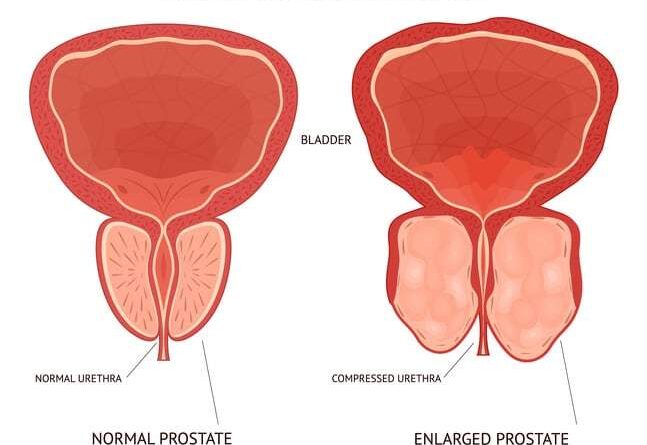
Ever found yourself thinking about what makes the prostate such an important part of your body? Let’s dive into the fascinating world of this little organ and explore how we can manage an enlarged prostate.
Understanding the Prostate and its Functions
The prostate, an essential part of the male reproductive system, plays a crucial role in producing the fluid that carries sperm. This walnut-sized gland surrounds the urethra, the tube that carries urine from your bladder out of the body.
What is an Enlarged Prostate?
An enlarged prostate, medically known as Benign Prostatic Hyperplasia (BPH), is a common condition that often affects men as they age. This condition implies an increase in the size of the prostate gland, causing it to press against the urethra.
Symptoms of an Enlarged Prostate
Have you ever experienced frequent urination, especially at night, or difficulty in starting to urinate? These could be telltale signs of an enlarged prostate. Other symptoms include weak urine flow, the inability to empty the bladder completely, or urinary tract infections.
How Does an Enlarged Prostate Affect Your Health?
You might be wondering, “What’s the big deal about having an enlarged prostate?”
Impact on Urinary Health
The trouble with an enlarged prostate is its location. As it expands, it can squeeze the urethra, resulting in numerous urinary issues, such as incontinence or recurrent urinary tract infections.
The Link Between Enlarged Prostate and Sexual Health
Surprisingly, an enlarged prostate can also interfere with your sexual health. Issues such as erectile dysfunction and reduced sexual desire have been linked to BPH.
Causes of an Enlarged Prostate
The exact causes of BPH are not entirely understood yet. However, aging and hormonal imbalances play a significant role.
How to Shrink an Enlarged Prostate
Now, the question you’ve been waiting for: “How can we shrink an enlarged prostate?”
Lifestyle Changes
Tackling an enlarged prostate may begin at home. Regular exercise, a balanced diet, limiting caffeine and alcohol, and maintaining a healthy weight can make a significant difference.
Medications
In many cases, doctors may prescribe medications to reduce the size of the prostate or to relax the muscles around the prostate, easing the symptoms.
Surgical Treatments
In severe cases, surgical intervention may be required. The goal is to remove or destroy the part of the prostate that is blocking urine flow.
Prevention Tips
While there’s no surefire way to prevent BPH, maintaining a healthy lifestyle can help you reduce your risk.
When to Seek Medical Help
Persistent or worsening symptoms should never be ignored. It’s time to see your doctor if you notice any significant changes in your urinary patterns or sexual health.
Wrap-Up: Managing Prostate Health
In the end, managing an enlarged prostate involves a combination of lifestyle changes, medical treatments, and regular check-ups. Remember, you are not alone in this journey, and there’s help at every step!
In Conclusion
Your journey towards managing an enlarged prostate is a marathon, not a sprint. It’s essential to stay informed, proactive, and open-minded to various treatment options.
Frequently Asked Questions
- What lifestyle changes can help manage an enlarged prostate?A combination of regular exercise, a balanced diet, limiting alcohol and caffeine intake, and maintaining a healthy weight can be beneficial.
- Are medications always necessary to treat an enlarged prostate?Not always. The necessity for medications depends on the severity of symptoms and the individual’s health profile.
- What kind of surgical options are available for treating an enlarged prostate?There are several types, including Transurethral Resection of the Prostate (TURP), Prostatectomy, and minimally invasive procedures.
- Can an enlarged prostate lead to prostate cancer?BPH is not cancer, and it does not increase the risk of prostate cancer. However, the symptoms can be similar, so it’s crucial to get a proper diagnosis.
- At what age does the prostate usually start to enlarge?BPH typically begins around the age of 40, with the chance increasing as a man ages.
- What kinds of foods are recommended for managing an enlarged prostate?Foods rich in Omega-3 fatty acids, like salmon and walnuts, along with fruits and vegetables high in antioxidants, such as berries and leafy greens, can be beneficial.
- What kind of exercises can help manage an enlarged prostate?Regular physical activity, including cardiovascular exercises like walking, jogging, and swimming, can help maintain a healthy weight, reducing pressure on the prostate.
- What over-the-counter (OTC) medications should be avoided if I have an enlarged prostate?Some over-the-counter medications, particularly decongestants and antihistamines, can worsen BPH symptoms. Always consult with a healthcare professional before taking new medications.
- Can an enlarged prostate be a sign of prostate cancer?Though the symptoms may be similar, having an enlarged prostate doesn’t necessarily mean you have prostate cancer. However, regular check-ups and screenings are recommended to rule out such conditions.
- Does the size of the prostate always correlate with the severity of the symptoms?
Interestingly, the size of the prostate does not always determine symptom severity. Some men with slightly enlarged prostates may have significant symptoms, while others with very enlarged prostates may have minor urinary symptoms.







